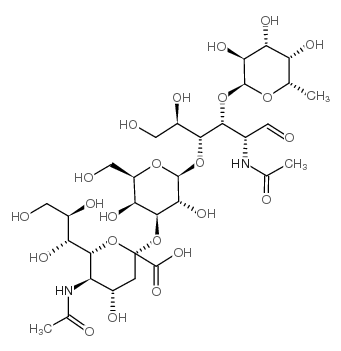| Description |
Sialyl-Lewis X (sLeX) is a sialylated fucosylated tetrasaccharide, an endogenous antigen. Sialyl-Lewis X is a high-affinity ligand for selectins (E-, P-, and L-selectin)[1]. Sialyl-Lewis X binds to ELAM-1 and CD62 and has the ability to inhibits CD62-mediated neutrophil recruitment to sites of inflammation[2].
|
| Related Catalog |
|
| In Vitro |
Sialyl-Lewis X is a high-affinity ligand of CD62, Antibodies [mAb CSLEX (IgM; anti-sLeX)] to sLeX inhibit CD62-mediated binding of HL-60 cells to activated platelets[1]. Liposomes containing glycolipids with the sLeX structure prevents adhesion of HL-60 cells and human neutrophils. HL-60 cell adhesion is partially inhibited (50%) by liposomes containing Lex at 5 μg/ml. However, sLeX liposomes give maximal inhibition at only 1 ug/ml. sLeX liposomes inhibits adhesion with a 10-fold higher affinity than Lex liposomes[1]. CD62 binding of neutrophils to activated platelets is inhibited a soluble human milk oligosaccharide that contains the LeX structure. the sLeX sugar is a 30-fold more potent inhibitor than the nonsialylated Lex sugar, which requires 2 μg/ml and 54 μg/ml to achieve 50% inhibition of neutrophil adhesion, respectively[1].
|
| References |
[1]. M J Polley, et al. CD62 and Endothelial Cell-Leukocyte Adhesion Molecule 1 (ELAM-1) Recognize the Same Carbohydrate Ligand, sialyl-Lewis X. Proc Natl Acad Sci U S A. 1991 Jul 15;88(14):6224-8. [2]. L A Lasky, et al. Selectins: Interpreters of Cell-Specific Carbohydrate Information During Inflammation. Science
|


